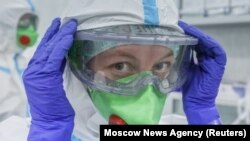With mainstream media providing the PR, a state-funded Russian research institute announced late last week that it has developed a prototype for a COVID-19 vaccine that could be ready for public use by early autumn. But scientists interviewed by Current Time caution that the institute’s optimism is likely premature.
In a May 22 interview with the Russian news agency Interfax, Gamalei Research Center for Epidemiology and Microbiology Director Aleksandr Ginzburg stated that Gamalei personnel – defined only as “developers, organizers of pre-clinical research and technology” -- had been injected with a vaccine based on a weakened version of the COVID-19 virus. The group had come out “alive, healthy, and happy,” he said.
The vaccine is based on an adenovirus vector, a group of viruses that can cause respiratory infections, among others, but that are relatively safe for humans. The vector conveys some elements of COVID-19 into the body, insufficient to spark a coronavirus infection, but able to trigger an immune response.
“This is nothing exotic,” commented Yury Kiselev, an associate professor of health sciences at OsloMet, a public university in the Norwegian capital, Oslo. “This is a known method” for developing vaccines, he said. “But there’s no way to predict [its] effectiveness and safety. You have to look at the results of the experiment.”
As yet, no official document about the experiment, its number of participants, or its findings appears to have been published. That has not, however, stopped the Gamalei Research Center from predicting when the vaccine could be used for national immunizations.
Pending permission from the Health Ministry, clinical trials on his center’s proto-vaccine could begin in the first 10 days of June, he said.
He initially predicted that the vaccine would be ready for use outside of the trials by late summer. Now, that has been revised to the beginning of autumn. In “the best case,” Ginzburg told the state-run Channel One’s May 25 Zhit Zdorovo! (Live Healthy!) talk show, vaccinating “all of the population” could take six to nine months.
Academician Vitaly Zverev, a research supervisor at Moscow’s state-financed Mechnikov Research Institute of Vaccines and Serums, called Ginzburg’s summer timeline as “unrealistic.” Within “such a short time frame, of course, it’s possible to create the prototype for a vaccine, but to test its safety is impossible,” he commented on Current Time’s May 23 Evening newscast.
Confirming its safety for humans, whether healthy or not, will take longer than weeks or several months, Zverev underlined.
No one, however, disputes the urgent need for such a vaccine: Russia currently has 353,427 cumulative cases of COVID-19, the second highest level in the world after the United States. It has posted a relatively low official death rate of 3,663 individuals.
While the Rospotrebnadzor consumer-rights watchdog coordinating the response to the crisis now claims that Russia’s coronavirus data has reached “a stable plateau,” the government still faces a growing economic burden from the virus, particularly amidst the crash in oil prices. The Central Bank has predicted that Gross Domestic Product could shrink by up to 6 percent in 2020.
To halt the virus, the Russian government has spent 3.1 billion rubles ($43.2 million) on developing coronavirus vaccines and tests, Deputy Prime Minister Tatyana Golikova told the upper house of the Russian parliament, the Federation Council, on May 20. Russian researchers currently are working on 47 different potential vaccines, she said.
Out of that number, nine are now undergoing clinical evaluation, according to the World Health Organization (WHO).
On May 13, Health Minister Mikhail Murashko told the Duma that “the first medicines” could appear as early as during the last 10 days of July.
But predicting that any COVID-19 vaccine will be ready before extensive testing and evaluation have been completed is a step backward for medical science, stressed molecular biologist Irina Yakutenko.
The declarations about the Gamalei proto-vaccine suggest that “we’ll now jump back a few centuries, and we’ll do what the first researchers were doing. We’ll test [the vaccine] on ourselves, and if I don’t die, that means that it’s possible to inject a few million people,” commented Yakutenko, who also works as a science journalist.
“That’s not correct. That’s a step backwards. We're rejecting all the standards that allow us to live well, and this is very dangerous.”
Zverev agreed, citing the severe health effects caused by an early polio vaccine, and the more recent dengue-fever and rotavirus vaccines. Any COVID-19 vaccine’s potential long-term effects also need to be considered, he cautioned.
Researchers usually examine a vaccine’s “chronic toxicity” for up to six months in animals, before then minutely examining how it has impacted the function and anatomy of an organ and the micro-anatomy of the organ’s blood vessels and tissues, he said.
“And only then do they move on to the serious experiments and do something [with the vaccine] on people.”
Although Ginzburg has stressed that “protective antibodies” to the vaccine were found in the test participants, such a formation does not guarantee that vaccinated individuals will not be infected by COVID-19, cautioned Yakutenko.
Antibodies are not “a panacea,” agreed Zverev. “This is only one of the methods capable of improving the quality of treatment and making it more effective. Nothing more than that.”
If the vaccine passes its clinical trials, medical workers treating coronavirus patients and, also, “organized groups,” such as construction workers, who cannot easily maintain social distancing, would be first up for inoculation.





Facebook Forum